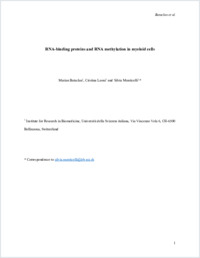RNA-binding proteins and RNA methylation in myeloid cells
- Bataclan, Marian ORCID Institute for Research in Biomedicine (IRB), Faculty of Biomedical Sciences, Università della Svizzera italiana, Switzerland
- Leoni, Cristina ORCID Institute for Research in Biomedicine (IRB), Faculty of Biomedical Sciences, Università della Svizzera italiana, Switzerland
- Monticelli, Silvia ORCID
- 2021
Submitted to:
- Immunological Reviews. - 2021
English
RNA-binding proteins (RBPs) regulate all aspects of the life of mRNA transcripts. They are critically important in regulating immune responses, most notably by restraining excessive inflammation that can potentially lead to tissue damage. RBPs are also crucial for pathogen sensing, for instance for the recognition of viral nucleic acids. Concordant with these central regulatory roles, the dysregulated activity of many RBPs can give rise to disease. The expression and function of RBPs are therefore highly controlled by an elaborate network of transcriptional, post-transcriptional and post-translational mechanisms, including the ability of different RBPs to cross-regulate each other’s expression. With an emphasis on macrophages and mast cells, we review current knowledge on the role of selected RBPs that have been shown to directly impact the expression of inflammatory transcripts. By focusing specifically on proteins of the Regnase and ZFP36 family, as well as on factors involved in N6-methyladenosine (m6A) deposition and recognition, we discuss mechanism of action, regulatory feedback, and impact of these selected proteins on immune responses. Finally, we include examples of the role of m6A and RBPs in the recognition of viral RNAs. Overall, we provide a general overview of the impact of selected RBPs on the myeloid compartment, followed by a discussion of outstanding questions and challenges for the future.
- Collections
- Language
-
- English
- Classification
- Biology, life sciences
- Other electronic version
- License
-
License undefined
- Open access status
- green
- Identifiers
-
- ARK ark:/12658/srd1325794
- Persistent URL
- https://n2t.net/ark:/12658/srd1325794
Statistics
Document views: 135
File downloads:
- Bataclan_preprint_2022_Immunol Rev: 80
